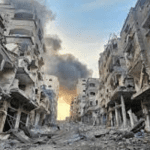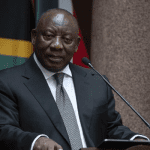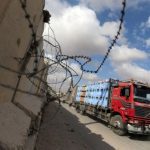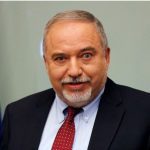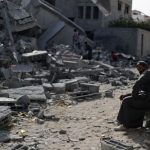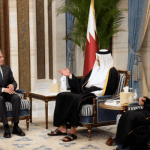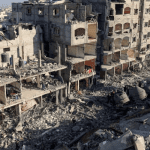France has called for an “immediate and durable truce” in the Israel-Hamas war, saying that it is deeply concerned about the situation in Gaza.
Foreign Minister Catherine Colonna added that too many civilians were being killed.
Israeli Foreign Minister Eli Cohen said a ceasefire would be an error, describing it as a gift to Hamas.
The UK and Germany earlier called for a “sustainable ceasefire”, but stopped short of saying it should be immediate.
Ms Colonna arrived in Tel Aviv on Sunday for a meeting with her Israeli counterpart Eli Cohen.
A statement released by the French Foreign Ministry before her visit said she would call for a truce, which should “lead to a lasting ceasefire with the aim of releasing all hostages and delivering aid to Gaza”.
During the meeting with Mr Cohen, the French foreign minister added that the victims of the Hamas attack on Israel on 7 October should not be forgotten.
Mr Cohen repeated the Israeli government’s position that there would be no ceasefire.
But he said that France could play an important role in preventing the escalation of regional tensions.
He added that while Israel “has no intention to start another front” on its northern border with Lebanon, it would do “whatever it takes” to protect Israeli citizens.
Israel has been engaged in regular cross-border exchanges of fire with armed groups in southern Lebanon, most notably with the Iran-backed Hezbollah.
Earlier on Sunday, UK Foreign Secretary David Cameron and German Foreign Minister Annalena Baerbock called for a “sustainable ceasefire” in the conflict.
In a joint article in the Sunday Times, Lord Cameron said he supported a ceasefire only if it was sustainable in the long term. Although this marks a shift in tone from the UK government, it does not go as far as calling for an immediate ceasefire.
On Tuesday, the UK and Germany abstained over a United Nations resolution to this effect, backed by 153 countries.
Instead the UK and Germany are pushing for further humanitarian pauses to get more aid in and more hostages out.
UK Foreign secretary backs ‘sustainable’ Gaza ceasefire
Catherine Colonna is also scheduled to meet the families of French hostages still being held by Hamas during her visit to Israel.
Referring to allegations of sexual assault during the 7 October attacks, Ms Colonna said France “believed the words of the victims” and those who witnessed the alleged attacks.
Earlier this week, the Israel Defense Forces (IDF) recovered the body of 28-year-old French-Israeli hostage Elya Toledano.
Israeli Prime Minister Benjamin Netanyahu has said the Israeli government is still trying to complete the recovery of all the hostages held in Gaza, saying military pressure on Hamas was needed to secure their release.
Mr Netanyahu has indicated that talks are happening, and there are reports which suggest both Egypt and Qatar are involved in the discussions.
But Hamas has said there will be no negotiations to release hostages “unless the aggression against our people stops once and for all”.
On Friday, the IDF accidentally killed three Israeli hostages during its operations in Gaza.
Yotam Haim, 28, Samer Talalka, 22, and Alon Shamriz, 26 were shot at whilst holding a white cloth – the IDF said the incident was “against our rules of engagement” and that it was investigating the incident.
There are still more than 120 people still being held in Gaza, and the accidental killing has added pressure on Israeli authorities to reach a deal for their release.
France’s Foreign Ministry has also demanded Israel explain an airstrike which killed one of its staff in Rafah this week.
The employee died of his injuries as a result of the strike in Rafah, which the foreign ministry said also killed other civilians.
The Hamas-run health ministry in Gaza says more than 18,700 people have been killed and over 50,000 injured in the territory since the start of the war.
France has called for an “immediate and durable truce” in the Israel-Hamas war, saying that it is deeply concerned about the situation in Gaza.
Foreign Minister Catherine Colonna added that too many civilians were being killed.
Israeli Foreign Minister Eli Cohen said a ceasefire would be an error, describing it as a gift to Hamas.
The UK and Germany earlier called for a “sustainable ceasefire”, but stopped short of saying it should be immediate.
Ms Colonna arrived in Tel Aviv on Sunday for a meeting with her Israeli counterpart Eli Cohen.
A statement released by the French Foreign Ministry before her visit said she would call for a truce, which should “lead to a lasting ceasefire with the aim of releasing all hostages and delivering aid to Gaza”.
During the meeting with Mr Cohen, the French foreign minister added that the victims of the Hamas attack on Israel on 7 October should not be forgotten.
Mr Cohen repeated the Israeli government’s position that there would be no ceasefire.
But he said that France could play an important role in preventing the escalation of regional tensions.
He added that while Israel “has no intention to start another front” on its northern border with Lebanon, it would do “whatever it takes” to protect Israeli citizens.
Israel has been engaged in regular cross-border exchanges of fire with armed groups in southern Lebanon, most notably with the Iran-backed Hezbollah.
Earlier on Sunday, UK Foreign Secretary David Cameron and German Foreign Minister Annalena Baerbock called for a “sustainable ceasefire” in the conflict.
In a joint article in the Sunday Times, Lord Cameron said he supported a ceasefire only if it was sustainable in the long term. Although this marks a shift in tone from the UK government, it does not go as far as calling for an immediate ceasefire.
On Tuesday, the UK and Germany abstained over a United Nations resolution to this effect, backed by 153 countries.
Instead the UK and Germany are pushing for further humanitarian pauses to get more aid in and more hostages out.
UK Foreign secretary backs ‘sustainable’ Gaza ceasefire
Catherine Colonna is also scheduled to meet the families of French hostages still being held by Hamas during her visit to Israel.
Referring to allegations of sexual assault during the 7 October attacks, Ms Colonna said France “believed the words of the victims” and those who witnessed the alleged attacks.
Earlier this week, the Israel Defense Forces (IDF) recovered the body of 28-year-old French-Israeli hostage Elya Toledano.
Israeli Prime Minister Benjamin Netanyahu has said the Israeli government is still trying to complete the recovery of all the hostages held in Gaza, saying military pressure on Hamas was needed to secure their release.
Mr Netanyahu has indicated that talks are happening, and there are reports which suggest both Egypt and Qatar are involved in the discussions.
But Hamas has said there will be no negotiations to release hostages “unless the aggression against our people stops once and for all”.
On Friday, the IDF accidentally killed three Israeli hostages during its operations in Gaza.
Yotam Haim, 28, Samer Talalka, 22, and Alon Shamriz, 26 were shot at whilst holding a white cloth – the IDF said the incident was “against our rules of engagement” and that it was investigating the incident.
There are still more than 120 people still being held in Gaza, and the accidental killing has added pressure on Israeli authorities to reach a deal for their release.
France’s Foreign Ministry has also demanded Israel explain an airstrike which killed one of its staff in Rafah this week.
The employee died of his injuries as a result of the strike in Rafah, which the foreign ministry said also killed other civilians.
The Hamas-run health ministry in Gaza says more than 18,700 people have been killed and over 50,000 injured in the territory since the start of the war.
France has called for an “immediate and durable truce” in the Israel-Hamas war, saying that it is deeply concerned about the situation in Gaza.
Foreign Minister Catherine Colonna added that too many civilians were being killed.
Israeli Foreign Minister Eli Cohen said a ceasefire would be an error, describing it as a gift to Hamas.
The UK and Germany earlier called for a “sustainable ceasefire”, but stopped short of saying it should be immediate.
Ms Colonna arrived in Tel Aviv on Sunday for a meeting with her Israeli counterpart Eli Cohen.
A statement released by the French Foreign Ministry before her visit said she would call for a truce, which should “lead to a lasting ceasefire with the aim of releasing all hostages and delivering aid to Gaza”.
During the meeting with Mr Cohen, the French foreign minister added that the victims of the Hamas attack on Israel on 7 October should not be forgotten.
Mr Cohen repeated the Israeli government’s position that there would be no ceasefire.
But he said that France could play an important role in preventing the escalation of regional tensions.
He added that while Israel “has no intention to start another front” on its northern border with Lebanon, it would do “whatever it takes” to protect Israeli citizens.
Israel has been engaged in regular cross-border exchanges of fire with armed groups in southern Lebanon, most notably with the Iran-backed Hezbollah.
Earlier on Sunday, UK Foreign Secretary David Cameron and German Foreign Minister Annalena Baerbock called for a “sustainable ceasefire” in the conflict.
In a joint article in the Sunday Times, Lord Cameron said he supported a ceasefire only if it was sustainable in the long term. Although this marks a shift in tone from the UK government, it does not go as far as calling for an immediate ceasefire.
On Tuesday, the UK and Germany abstained over a United Nations resolution to this effect, backed by 153 countries.
Instead the UK and Germany are pushing for further humanitarian pauses to get more aid in and more hostages out.
UK Foreign secretary backs ‘sustainable’ Gaza ceasefire
Catherine Colonna is also scheduled to meet the families of French hostages still being held by Hamas during her visit to Israel.
Referring to allegations of sexual assault during the 7 October attacks, Ms Colonna said France “believed the words of the victims” and those who witnessed the alleged attacks.
Earlier this week, the Israel Defense Forces (IDF) recovered the body of 28-year-old French-Israeli hostage Elya Toledano.
Israeli Prime Minister Benjamin Netanyahu has said the Israeli government is still trying to complete the recovery of all the hostages held in Gaza, saying military pressure on Hamas was needed to secure their release.
Mr Netanyahu has indicated that talks are happening, and there are reports which suggest both Egypt and Qatar are involved in the discussions.
But Hamas has said there will be no negotiations to release hostages “unless the aggression against our people stops once and for all”.
On Friday, the IDF accidentally killed three Israeli hostages during its operations in Gaza.
Yotam Haim, 28, Samer Talalka, 22, and Alon Shamriz, 26 were shot at whilst holding a white cloth – the IDF said the incident was “against our rules of engagement” and that it was investigating the incident.
There are still more than 120 people still being held in Gaza, and the accidental killing has added pressure on Israeli authorities to reach a deal for their release.
France’s Foreign Ministry has also demanded Israel explain an airstrike which killed one of its staff in Rafah this week.
The employee died of his injuries as a result of the strike in Rafah, which the foreign ministry said also killed other civilians.
The Hamas-run health ministry in Gaza says more than 18,700 people have been killed and over 50,000 injured in the territory since the start of the war.
France has called for an “immediate and durable truce” in the Israel-Hamas war, saying that it is deeply concerned about the situation in Gaza.
Foreign Minister Catherine Colonna added that too many civilians were being killed.
Israeli Foreign Minister Eli Cohen said a ceasefire would be an error, describing it as a gift to Hamas.
The UK and Germany earlier called for a “sustainable ceasefire”, but stopped short of saying it should be immediate.
Ms Colonna arrived in Tel Aviv on Sunday for a meeting with her Israeli counterpart Eli Cohen.
A statement released by the French Foreign Ministry before her visit said she would call for a truce, which should “lead to a lasting ceasefire with the aim of releasing all hostages and delivering aid to Gaza”.
During the meeting with Mr Cohen, the French foreign minister added that the victims of the Hamas attack on Israel on 7 October should not be forgotten.
Mr Cohen repeated the Israeli government’s position that there would be no ceasefire.
But he said that France could play an important role in preventing the escalation of regional tensions.
He added that while Israel “has no intention to start another front” on its northern border with Lebanon, it would do “whatever it takes” to protect Israeli citizens.
Israel has been engaged in regular cross-border exchanges of fire with armed groups in southern Lebanon, most notably with the Iran-backed Hezbollah.
Earlier on Sunday, UK Foreign Secretary David Cameron and German Foreign Minister Annalena Baerbock called for a “sustainable ceasefire” in the conflict.
In a joint article in the Sunday Times, Lord Cameron said he supported a ceasefire only if it was sustainable in the long term. Although this marks a shift in tone from the UK government, it does not go as far as calling for an immediate ceasefire.
On Tuesday, the UK and Germany abstained over a United Nations resolution to this effect, backed by 153 countries.
Instead the UK and Germany are pushing for further humanitarian pauses to get more aid in and more hostages out.
UK Foreign secretary backs ‘sustainable’ Gaza ceasefire
Catherine Colonna is also scheduled to meet the families of French hostages still being held by Hamas during her visit to Israel.
Referring to allegations of sexual assault during the 7 October attacks, Ms Colonna said France “believed the words of the victims” and those who witnessed the alleged attacks.
Earlier this week, the Israel Defense Forces (IDF) recovered the body of 28-year-old French-Israeli hostage Elya Toledano.
Israeli Prime Minister Benjamin Netanyahu has said the Israeli government is still trying to complete the recovery of all the hostages held in Gaza, saying military pressure on Hamas was needed to secure their release.
Mr Netanyahu has indicated that talks are happening, and there are reports which suggest both Egypt and Qatar are involved in the discussions.
But Hamas has said there will be no negotiations to release hostages “unless the aggression against our people stops once and for all”.
On Friday, the IDF accidentally killed three Israeli hostages during its operations in Gaza.
Yotam Haim, 28, Samer Talalka, 22, and Alon Shamriz, 26 were shot at whilst holding a white cloth – the IDF said the incident was “against our rules of engagement” and that it was investigating the incident.
There are still more than 120 people still being held in Gaza, and the accidental killing has added pressure on Israeli authorities to reach a deal for their release.
France’s Foreign Ministry has also demanded Israel explain an airstrike which killed one of its staff in Rafah this week.
The employee died of his injuries as a result of the strike in Rafah, which the foreign ministry said also killed other civilians.
The Hamas-run health ministry in Gaza says more than 18,700 people have been killed and over 50,000 injured in the territory since the start of the war.
France has called for an “immediate and durable truce” in the Israel-Hamas war, saying that it is deeply concerned about the situation in Gaza.
Foreign Minister Catherine Colonna added that too many civilians were being killed.
Israeli Foreign Minister Eli Cohen said a ceasefire would be an error, describing it as a gift to Hamas.
The UK and Germany earlier called for a “sustainable ceasefire”, but stopped short of saying it should be immediate.
Ms Colonna arrived in Tel Aviv on Sunday for a meeting with her Israeli counterpart Eli Cohen.
A statement released by the French Foreign Ministry before her visit said she would call for a truce, which should “lead to a lasting ceasefire with the aim of releasing all hostages and delivering aid to Gaza”.
During the meeting with Mr Cohen, the French foreign minister added that the victims of the Hamas attack on Israel on 7 October should not be forgotten.
Mr Cohen repeated the Israeli government’s position that there would be no ceasefire.
But he said that France could play an important role in preventing the escalation of regional tensions.
He added that while Israel “has no intention to start another front” on its northern border with Lebanon, it would do “whatever it takes” to protect Israeli citizens.
Israel has been engaged in regular cross-border exchanges of fire with armed groups in southern Lebanon, most notably with the Iran-backed Hezbollah.
Earlier on Sunday, UK Foreign Secretary David Cameron and German Foreign Minister Annalena Baerbock called for a “sustainable ceasefire” in the conflict.
In a joint article in the Sunday Times, Lord Cameron said he supported a ceasefire only if it was sustainable in the long term. Although this marks a shift in tone from the UK government, it does not go as far as calling for an immediate ceasefire.
On Tuesday, the UK and Germany abstained over a United Nations resolution to this effect, backed by 153 countries.
Instead the UK and Germany are pushing for further humanitarian pauses to get more aid in and more hostages out.
UK Foreign secretary backs ‘sustainable’ Gaza ceasefire
Catherine Colonna is also scheduled to meet the families of French hostages still being held by Hamas during her visit to Israel.
Referring to allegations of sexual assault during the 7 October attacks, Ms Colonna said France “believed the words of the victims” and those who witnessed the alleged attacks.
Earlier this week, the Israel Defense Forces (IDF) recovered the body of 28-year-old French-Israeli hostage Elya Toledano.
Israeli Prime Minister Benjamin Netanyahu has said the Israeli government is still trying to complete the recovery of all the hostages held in Gaza, saying military pressure on Hamas was needed to secure their release.
Mr Netanyahu has indicated that talks are happening, and there are reports which suggest both Egypt and Qatar are involved in the discussions.
But Hamas has said there will be no negotiations to release hostages “unless the aggression against our people stops once and for all”.
On Friday, the IDF accidentally killed three Israeli hostages during its operations in Gaza.
Yotam Haim, 28, Samer Talalka, 22, and Alon Shamriz, 26 were shot at whilst holding a white cloth – the IDF said the incident was “against our rules of engagement” and that it was investigating the incident.
There are still more than 120 people still being held in Gaza, and the accidental killing has added pressure on Israeli authorities to reach a deal for their release.
France’s Foreign Ministry has also demanded Israel explain an airstrike which killed one of its staff in Rafah this week.
The employee died of his injuries as a result of the strike in Rafah, which the foreign ministry said also killed other civilians.
The Hamas-run health ministry in Gaza says more than 18,700 people have been killed and over 50,000 injured in the territory since the start of the war.
France has called for an “immediate and durable truce” in the Israel-Hamas war, saying that it is deeply concerned about the situation in Gaza.
Foreign Minister Catherine Colonna added that too many civilians were being killed.
Israeli Foreign Minister Eli Cohen said a ceasefire would be an error, describing it as a gift to Hamas.
The UK and Germany earlier called for a “sustainable ceasefire”, but stopped short of saying it should be immediate.
Ms Colonna arrived in Tel Aviv on Sunday for a meeting with her Israeli counterpart Eli Cohen.
A statement released by the French Foreign Ministry before her visit said she would call for a truce, which should “lead to a lasting ceasefire with the aim of releasing all hostages and delivering aid to Gaza”.
During the meeting with Mr Cohen, the French foreign minister added that the victims of the Hamas attack on Israel on 7 October should not be forgotten.
Mr Cohen repeated the Israeli government’s position that there would be no ceasefire.
But he said that France could play an important role in preventing the escalation of regional tensions.
He added that while Israel “has no intention to start another front” on its northern border with Lebanon, it would do “whatever it takes” to protect Israeli citizens.
Israel has been engaged in regular cross-border exchanges of fire with armed groups in southern Lebanon, most notably with the Iran-backed Hezbollah.
Earlier on Sunday, UK Foreign Secretary David Cameron and German Foreign Minister Annalena Baerbock called for a “sustainable ceasefire” in the conflict.
In a joint article in the Sunday Times, Lord Cameron said he supported a ceasefire only if it was sustainable in the long term. Although this marks a shift in tone from the UK government, it does not go as far as calling for an immediate ceasefire.
On Tuesday, the UK and Germany abstained over a United Nations resolution to this effect, backed by 153 countries.
Instead the UK and Germany are pushing for further humanitarian pauses to get more aid in and more hostages out.
UK Foreign secretary backs ‘sustainable’ Gaza ceasefire
Catherine Colonna is also scheduled to meet the families of French hostages still being held by Hamas during her visit to Israel.
Referring to allegations of sexual assault during the 7 October attacks, Ms Colonna said France “believed the words of the victims” and those who witnessed the alleged attacks.
Earlier this week, the Israel Defense Forces (IDF) recovered the body of 28-year-old French-Israeli hostage Elya Toledano.
Israeli Prime Minister Benjamin Netanyahu has said the Israeli government is still trying to complete the recovery of all the hostages held in Gaza, saying military pressure on Hamas was needed to secure their release.
Mr Netanyahu has indicated that talks are happening, and there are reports which suggest both Egypt and Qatar are involved in the discussions.
But Hamas has said there will be no negotiations to release hostages “unless the aggression against our people stops once and for all”.
On Friday, the IDF accidentally killed three Israeli hostages during its operations in Gaza.
Yotam Haim, 28, Samer Talalka, 22, and Alon Shamriz, 26 were shot at whilst holding a white cloth – the IDF said the incident was “against our rules of engagement” and that it was investigating the incident.
There are still more than 120 people still being held in Gaza, and the accidental killing has added pressure on Israeli authorities to reach a deal for their release.
France’s Foreign Ministry has also demanded Israel explain an airstrike which killed one of its staff in Rafah this week.
The employee died of his injuries as a result of the strike in Rafah, which the foreign ministry said also killed other civilians.
The Hamas-run health ministry in Gaza says more than 18,700 people have been killed and over 50,000 injured in the territory since the start of the war.
France has called for an “immediate and durable truce” in the Israel-Hamas war, saying that it is deeply concerned about the situation in Gaza.
Foreign Minister Catherine Colonna added that too many civilians were being killed.
Israeli Foreign Minister Eli Cohen said a ceasefire would be an error, describing it as a gift to Hamas.
The UK and Germany earlier called for a “sustainable ceasefire”, but stopped short of saying it should be immediate.
Ms Colonna arrived in Tel Aviv on Sunday for a meeting with her Israeli counterpart Eli Cohen.
A statement released by the French Foreign Ministry before her visit said she would call for a truce, which should “lead to a lasting ceasefire with the aim of releasing all hostages and delivering aid to Gaza”.
During the meeting with Mr Cohen, the French foreign minister added that the victims of the Hamas attack on Israel on 7 October should not be forgotten.
Mr Cohen repeated the Israeli government’s position that there would be no ceasefire.
But he said that France could play an important role in preventing the escalation of regional tensions.
He added that while Israel “has no intention to start another front” on its northern border with Lebanon, it would do “whatever it takes” to protect Israeli citizens.
Israel has been engaged in regular cross-border exchanges of fire with armed groups in southern Lebanon, most notably with the Iran-backed Hezbollah.
Earlier on Sunday, UK Foreign Secretary David Cameron and German Foreign Minister Annalena Baerbock called for a “sustainable ceasefire” in the conflict.
In a joint article in the Sunday Times, Lord Cameron said he supported a ceasefire only if it was sustainable in the long term. Although this marks a shift in tone from the UK government, it does not go as far as calling for an immediate ceasefire.
On Tuesday, the UK and Germany abstained over a United Nations resolution to this effect, backed by 153 countries.
Instead the UK and Germany are pushing for further humanitarian pauses to get more aid in and more hostages out.
UK Foreign secretary backs ‘sustainable’ Gaza ceasefire
Catherine Colonna is also scheduled to meet the families of French hostages still being held by Hamas during her visit to Israel.
Referring to allegations of sexual assault during the 7 October attacks, Ms Colonna said France “believed the words of the victims” and those who witnessed the alleged attacks.
Earlier this week, the Israel Defense Forces (IDF) recovered the body of 28-year-old French-Israeli hostage Elya Toledano.
Israeli Prime Minister Benjamin Netanyahu has said the Israeli government is still trying to complete the recovery of all the hostages held in Gaza, saying military pressure on Hamas was needed to secure their release.
Mr Netanyahu has indicated that talks are happening, and there are reports which suggest both Egypt and Qatar are involved in the discussions.
But Hamas has said there will be no negotiations to release hostages “unless the aggression against our people stops once and for all”.
On Friday, the IDF accidentally killed three Israeli hostages during its operations in Gaza.
Yotam Haim, 28, Samer Talalka, 22, and Alon Shamriz, 26 were shot at whilst holding a white cloth – the IDF said the incident was “against our rules of engagement” and that it was investigating the incident.
There are still more than 120 people still being held in Gaza, and the accidental killing has added pressure on Israeli authorities to reach a deal for their release.
France’s Foreign Ministry has also demanded Israel explain an airstrike which killed one of its staff in Rafah this week.
The employee died of his injuries as a result of the strike in Rafah, which the foreign ministry said also killed other civilians.
The Hamas-run health ministry in Gaza says more than 18,700 people have been killed and over 50,000 injured in the territory since the start of the war.
France has called for an “immediate and durable truce” in the Israel-Hamas war, saying that it is deeply concerned about the situation in Gaza.
Foreign Minister Catherine Colonna added that too many civilians were being killed.
Israeli Foreign Minister Eli Cohen said a ceasefire would be an error, describing it as a gift to Hamas.
The UK and Germany earlier called for a “sustainable ceasefire”, but stopped short of saying it should be immediate.
Ms Colonna arrived in Tel Aviv on Sunday for a meeting with her Israeli counterpart Eli Cohen.
A statement released by the French Foreign Ministry before her visit said she would call for a truce, which should “lead to a lasting ceasefire with the aim of releasing all hostages and delivering aid to Gaza”.
During the meeting with Mr Cohen, the French foreign minister added that the victims of the Hamas attack on Israel on 7 October should not be forgotten.
Mr Cohen repeated the Israeli government’s position that there would be no ceasefire.
But he said that France could play an important role in preventing the escalation of regional tensions.
He added that while Israel “has no intention to start another front” on its northern border with Lebanon, it would do “whatever it takes” to protect Israeli citizens.
Israel has been engaged in regular cross-border exchanges of fire with armed groups in southern Lebanon, most notably with the Iran-backed Hezbollah.
Earlier on Sunday, UK Foreign Secretary David Cameron and German Foreign Minister Annalena Baerbock called for a “sustainable ceasefire” in the conflict.
In a joint article in the Sunday Times, Lord Cameron said he supported a ceasefire only if it was sustainable in the long term. Although this marks a shift in tone from the UK government, it does not go as far as calling for an immediate ceasefire.
On Tuesday, the UK and Germany abstained over a United Nations resolution to this effect, backed by 153 countries.
Instead the UK and Germany are pushing for further humanitarian pauses to get more aid in and more hostages out.
UK Foreign secretary backs ‘sustainable’ Gaza ceasefire
Catherine Colonna is also scheduled to meet the families of French hostages still being held by Hamas during her visit to Israel.
Referring to allegations of sexual assault during the 7 October attacks, Ms Colonna said France “believed the words of the victims” and those who witnessed the alleged attacks.
Earlier this week, the Israel Defense Forces (IDF) recovered the body of 28-year-old French-Israeli hostage Elya Toledano.
Israeli Prime Minister Benjamin Netanyahu has said the Israeli government is still trying to complete the recovery of all the hostages held in Gaza, saying military pressure on Hamas was needed to secure their release.
Mr Netanyahu has indicated that talks are happening, and there are reports which suggest both Egypt and Qatar are involved in the discussions.
But Hamas has said there will be no negotiations to release hostages “unless the aggression against our people stops once and for all”.
On Friday, the IDF accidentally killed three Israeli hostages during its operations in Gaza.
Yotam Haim, 28, Samer Talalka, 22, and Alon Shamriz, 26 were shot at whilst holding a white cloth – the IDF said the incident was “against our rules of engagement” and that it was investigating the incident.
There are still more than 120 people still being held in Gaza, and the accidental killing has added pressure on Israeli authorities to reach a deal for their release.
France’s Foreign Ministry has also demanded Israel explain an airstrike which killed one of its staff in Rafah this week.
The employee died of his injuries as a result of the strike in Rafah, which the foreign ministry said also killed other civilians.
The Hamas-run health ministry in Gaza says more than 18,700 people have been killed and over 50,000 injured in the territory since the start of the war.



